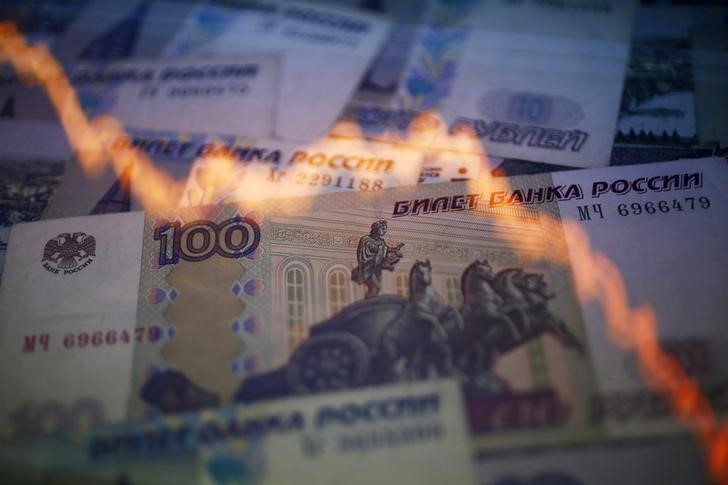By Gabrielle Tétrault-Farber and Elena Fabrichnaya
MOSCOW (Reuters) - Russian companies are set to increase their borrowings via rouble bonds next year from $200 billion currently outstanding on the market, benefiting from aggressive rate cuts by the central bank, bankers and analysts say.
Reacting to slowing inflation, Russia's central bank last month carried out its largest rate cut in two years, trimming the key rate to 6.50% from 7%, and did not rule out it could slash rates again at its board meeting on Dec. 13.
Lower rates have made it cheaper for companies to borrow to finance their operations, which are largely carried out in rubles. This has spurred growth on the local bond market, which since 2014 has benefited from external markets being largely inaccessible because of Western sanctions against Moscow.
Since then, the Russian domestic corporate bond market has more than doubled in size.
Foreigners have been traditionally attracted to Russia's OFZ treasury rouble bonds, which are auctioned weekly by the Finance Ministry and provide healthy returns comparing to Western markets. But as corporate bond yields are on average higher than those of OFZs, corporate rouble bonds could give investors, including from abroad, more attractive returns.
Alaa Bushehri, portfolio manager at BNP Paribas (PA:BNPP) Asset Management, said that corporate rouble bonds earlier this year offered valuations of 150 basis points over OFZ bonds.
In October, Russian companies issued 60 new rouble-denominated bond issues, the highest volume since early 2015, according to Sberbank. As of Oct. 1, corporate bonds worth 13 trillion rubles ($200 billion) were being traded on the market, the central bank said.
"We expect an increase in corporate (rouble bond) market next year, mostly thanks to new players, as the bond market has for a long time proven to be a key source of financing for real sector companies," said Eduard Dzhabarov, co-head of the debt capital markets department at Sberbank.
Dzhabarov pointed to the firmer the rouble, which has strengthened nearly 9% against the U.S. dollar since the start of the year, and the rate cut by the central bank, as key reasons behind record volumes in October.
Alexei Konochkin, deputy head of the debt capital markets department of VTB Capital, said new corporate bond issues could increase 25% in year-on-year terms to reach 2 trillion rubles in 2019, and that their outlook remained positive for 2020.
SUPPORT FROM BANKS
After the global financial crisis of 2008, which seriously affected Russia, the central bank created what it calls a central counterparty, a special entity tasked with mitigating risks on the domestic equity, debt and financial markets.
Russia's domestic bond market has so far not been subject to any major shocks, in part because the biggest borrowers are large, state-controlled firms in the energy, transportation and banking sectors, according to data from Russia's ACRA ratings agency.
Banks, which are the main purchasers of these bonds, have also helped the corporate bond market. The central bank expects banks' excess liquidity to increase to up to 4.6 trillion rubles next year, which could help them further support the market.
Rosneft, Russia's top oil company, has been the most active issuer in terms of the volume of outstanding rouble bonds.
As of January, it had more than $44.5 billion worth of rouble bonds outstanding because it needed to finance its capital expenditure program in the absence of access to external markets since 2014.
In the first six months of the year, Sberbank, the country's largest bank, was the most active borrower, raising almost 96 billion rubles.
